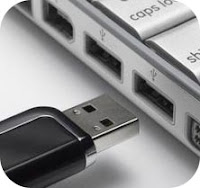
|
| Computer USB Ports |
Whether we are using an office or personalcomputer / laptop, having an open or enabled USB ports on our machines can pose a great computer security threat where any computer user can plugin a possible virus infected flash disk, external hard drive, or any other USB capable devices. Unrestricted USB ports can also create an uncontrolled flow of data within our computers; enabling other users to sneak out personal or corporate data and save it via USB.
With these, two (2) possible workaround or solutions would be either (1) disable or blockUSB ports or a smarter way is to (2) disable write access of USB ports. Here's how to do it:
Disable or Block USB Ports in Windows
(works on Windows XP, Vista, and 7)2. In the Open box, type regedit, and then click OK.
3. Locate, and then click the following registry key:
HKEY_LOCAL_MACHINE\SYSTEM\CurrentControlSet\ Services\UsbStor
4. In the right pane, double-click Start.
5. In the Value data box, type 4, click Hexadecimal (if it is not already selected), and then click OK.
6. Quit Registry Editor.
Note: may require Administrative privileges to open RegEdit.
Disable Write Access of USB Ports in Windows
(works on Windows XP SP2 or higher)1. Click Start, and then click Run.
2. In the Open box, type regedit, and then click OK.
3. Locate, and then click the following registry key:
HKEY_LOCAL_MACHINE\System\CurrentControlSet\ Control\StorageDevicePolicies
4. In the right pane, create a new DWORD called WriteProtect.
5. In the Value data box, type 0, click Hexadecimal (if it is not already selected), and then click OK.
6. Quit Registry Editor.
Did these tricks work for you? Don't forget to share this post to your friends if you find it useful.





 Subscribe
Subscribe
 Follow Us!
Follow Us!
 Be Our Fan
Be Our Fan

























